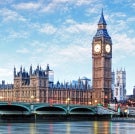A furious row has erupted over reforms set to bar MPs from Parliament if they are arrested for serious sexual or violent offences, with Grant Shapps calling the changes the “wrong side of natural justice”.
MPs voted by a majority of one for the measure on Monday night.
Controversially, the move was backed by former prime minister Theresa May, six years after she restored the whip to MPs accused of inappropriate sexual behaviour as she battled to save her premiership.
Tory MP Andrew Rosindell, who was cleared earlier this year after a four-year investigation into allegations of rape, said he was “appalled” by the move.
“The principle of innocent until proven guilty has been lost,” he told The Independent.
Defence Secretary Mr Shapps said: “For me, it does seem to be just on the wrong side of natural justice. And that is why I voted to say wait for a charge. But there are passionate arguments in both directions. And I can see you can make that argument in both directions.
“I thought it is slightly the wrong side of the line,” he told Times Radio.
But Labour former minister Sir Chris Bryant said the move would simply bring parliament in line with other workplaces.
In the past some MPs have been asked to stay away from parliament by their own parties.
But they are under no obligation to comply, and critics have warned that that system is open to abuse.
Under the reforms a panel appointed by the Commons Speaker can force an MP to stay away after they had been arrested.
Ministers were accused of trying to ‘water down’ the measure as they sought to set a higher bar, meaning an MP would have to be charged not merely arrested.
However, MPs, including Mrs May, voted to set the threshold as arrest.
In 2018, the then PM Mrs May was heavily criticised for letting two suspended Conservative MPs take part in a vote of confidence in her leadership, including Charlie Elphicke.
Also voting for the reform was Mr Elphicke’s ex-wife Natalie, who replaced him as the MP for Dover and who last week stunned Westminster when she defected from the Conservatives to Labour.
Attempts to set the bar at arrest had been so widely expected to fail, that Labour’s Jess Phillips wrote on X: “Shit! We won the vote by one.”
Earlier on Monday she told the Commons she had spoken to two women who were raped by MPs, adding “that’s a fairly standard day for me.”
She also accused MPs of acting like “we’re some sort of superior beings and the people who currently get excluded are often young women – and I’ve dealt with cases who are young men – who never work in politics again.”
But Conservative former minister Sir Jacob Rees-Mogg described the plans as an “extraordinary power grab.”
He said it was important that MPs’ constituents were represented in the House of Commons “and they are not only represented by votes, indeed most of the time they are least represented by votes because they go the way of a Government majority with one more or less not making a ha’p’orth (halfpennyworth) of difference.
“But the real representation is in this very room. It is not even in Westminster Hall or in committee, it is in this great cockpit of debate, and taking away that right by a cabal is against the constitution.”
Source: independent.co.uk



